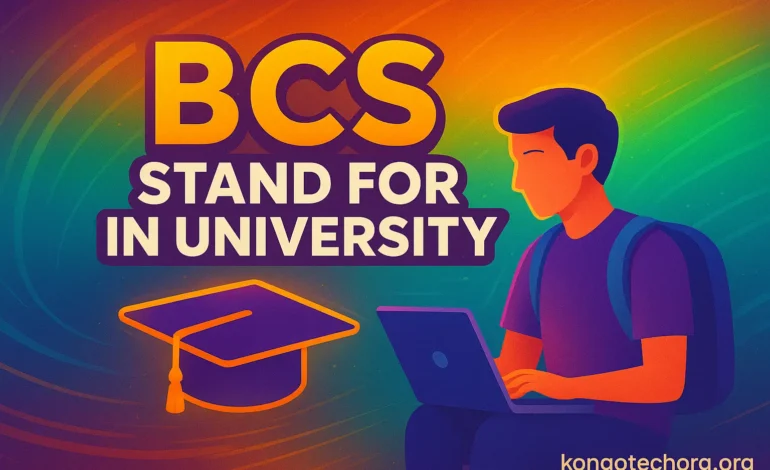What Does BCS Stand For in University & Why It Matters?

If you’ve ever wondered what does BCS stand for in university, you’re not alone. Many students come across this abbreviation while exploring higher education options and get curious about its real meaning. The term BCS full form refers to Bachelor of Computer Science, a program that has become one of the most popular pathways for students who want to dive deep into technology, software, and digital innovation. But the meaning of BCS in education goes beyond just a degree name, it represents opportunities, skills, and a future filled with possibilities in the tech-driven world.
Let’s take a closer look at the BCS degree, why it matters, and how it can shape your future.
Understanding BCS in the University Context
At its core, BCS stands for Bachelor of Computer Science. This program is offered in many universities worldwide and is designed to give students both theoretical and practical knowledge about how computers work, how software is developed, and how technology can solve real-world problems.
Unlike a generic computer course, a university BCS program focuses on building a strong foundation in algorithms, programming, databases, and emerging fields like artificial intelligence and cybersecurity. Students don’t just learn coding, but also the logic, mathematics, and problem-solving methods behind computing.
Read Also: What Is Yexex – Complete Information for Curious Readers?
BCS Full Form in English and Hindi
When discussing BCS full form, it’s important to note that in English it refers to Bachelor of Computer Science. However, for learners in India, many also explore BCS in Hindi, where it is translated as कंप्यूटर विज्ञान स्नातक (Kampyūṭar Vijñān Snātak). Both versions highlight the same concept, a degree that focuses on computer science education at the undergraduate level.
Why Students Choose BCS Over Other Courses
Choosing a computer science degree is no longer just for those who love coding. Technology has become part of every industry, and graduates with strong computer science skills are highly sought after. Students see BCS as a stepping stone to multiple career paths, from software development and data science to gaming and cybersecurity.
The university BCS program is often compared to a Bachelor of Science in Computer Science. This comparison, known as BCS vs BSc Computer Science, highlights that while both degrees cover similar ground, some universities brand their program as BCS while others use BSc. The key difference often lies in course structure or regional naming conventions, but the career prospects remain equally strong.
Academic Path and Course Structure
The academic path for BCS is structured to take students through multiple stages of computer learning. In the early years, students are introduced to basic subjects such as mathematics, logic, and a computer programming course. This stage builds the essential foundation.
As students progress, they encounter more specialized topics, including computer networks, data structures, databases, and software engineering. In advanced semesters, options like data science with BCS, artificial intelligence BCS modules, and cybersecurity BCS specialization open the door to deeper knowledge in fast-growing fields.
Many universities also encourage practical learning by including projects, internships, and coding labs, ensuring graduates are industry-ready.
Skills Needed for BCS Students
A student enrolling in a Bachelor of Computer Science doesn’t need to be a genius in mathematics, but certain skills make the journey smoother and more rewarding. Strong analytical thinking, problem-solving, and logical reasoning are must-haves. Technical skills such as programming, database management, and software design come with training, but curiosity and adaptability are equally important.
The skills needed for BCS extend beyond technical areas. Communication, teamwork, and creativity also matter because modern software projects are collaborative and innovation-driven. These soft skills combined with technical mastery create a complete professional ready for the global tech industry.
Career Prospects After BCS
The career prospects after BCS are vast and diverse. Graduates often secure roles as software developers, IT consultants, system analysts, data analysts, or cybersecurity experts. Some even enter the gaming sector, using their knowledge from game development with BCS courses.
With the rapid rise of artificial intelligence, machine learning, and automation, new roles continue to appear. Many industries including healthcare, finance, entertainment, and e-commerce are seeking professionals with a solid computer science degree. Tech industry opportunities with BCS graduates are not limited to one sector; the demand spans across multiple fields.
Specializations Available in BCS
Universities worldwide offer multiple specializations in BCS to match student interests. Popular options include software engineering, artificial intelligence BCS pathways, cybersecurity BCS specialization, data science with BCS, and even game development with BCS.
These specializations let students tailor their academic journey to match career goals. For example, a student interested in security can pursue advanced courses in cybersecurity, while someone fascinated by data patterns can explore data science. This flexibility is one reason why the future scope of BCS degree is considered strong.
Higher Studies and Research After BCS
Many students choose to pursue higher studies after BCS to specialize further. Common postgraduate options include Master’s programs in computer science, data science, artificial intelligence, or cybersecurity. Some also move into research and pursue doctoral programs to contribute to academic advancements in the field.
Higher studies after BCS not only enhance knowledge but also increase career opportunities in academia, research, and leadership positions in the tech industry.
BCS and the Global Tech Landscape
The digital world is evolving rapidly, and with it, the demand for skilled professionals is growing. A computer science degree equips graduates to face these changes with confidence. Whether it’s contributing to advancements in artificial intelligence, developing secure computer networks, or creating immersive experiences through gaming, BCS graduates are at the forefront of innovation.
The future scope of BCS degree lies in its adaptability. Technology is never static, and BCS ensures that students are trained to adapt, learn continuously, and remain relevant.
Why BCS Still Matters Today
You might wonder, with so many online courses and certifications available, does a university BCS program still hold weight? The answer is yes. A Bachelor of Computer Science provides structured learning, academic depth, and recognition that most short-term courses can’t match. Employers trust the degree because it shows not only technical training but also discipline, persistence, and the ability to complete a comprehensive academic path for BCS.
Conclusion
So, what does BCS stand for in university? It stands for Bachelor of Computer Science, a degree that has shaped countless careers in technology. But more than just an abbreviation, BCS represents a world of opportunities—an entry point into one of the most influential fields of our time. From computer programming courses to advanced topics like artificial intelligence and cybersecurity, the journey of BCS is designed to prepare students for the digital future.
Whether you’re interested in pursuing higher studies after BCS, exploring specializations, or jumping straight into career prospects after BCS, the degree opens doors to endless possibilities. The tech industry opportunities with BCS graduates continue to grow, making it one of the smartest choices for students who dream of being part of the digital revolution.
If you’re curious, ambitious, and ready to learn, then a Bachelor of Computer Science may just be the perfect path for you.
FAQs
Q1. What does BCS stand for in university?
BCS stands for Bachelor of Computer Science, an undergraduate degree in computer science.
Q2. Is BCS the same as BSc Computer Science?
Yes, BCS vs BSc Computer Science is mostly about naming differences. Both cover similar subjects in computer science.
Q3. What are the career prospects after BCS?
Graduates can work as software developers, data analysts, IT consultants, or cybersecurity specialists.
Q4. Can I pursue higher studies after BCS?
Yes, you can pursue master’s or doctoral programs in computer science, AI, data science, or related fields.
Q5. What skills are needed for success in BCS?
Students need problem-solving, analytical thinking, programming knowledge, and adaptability to new technologies.




